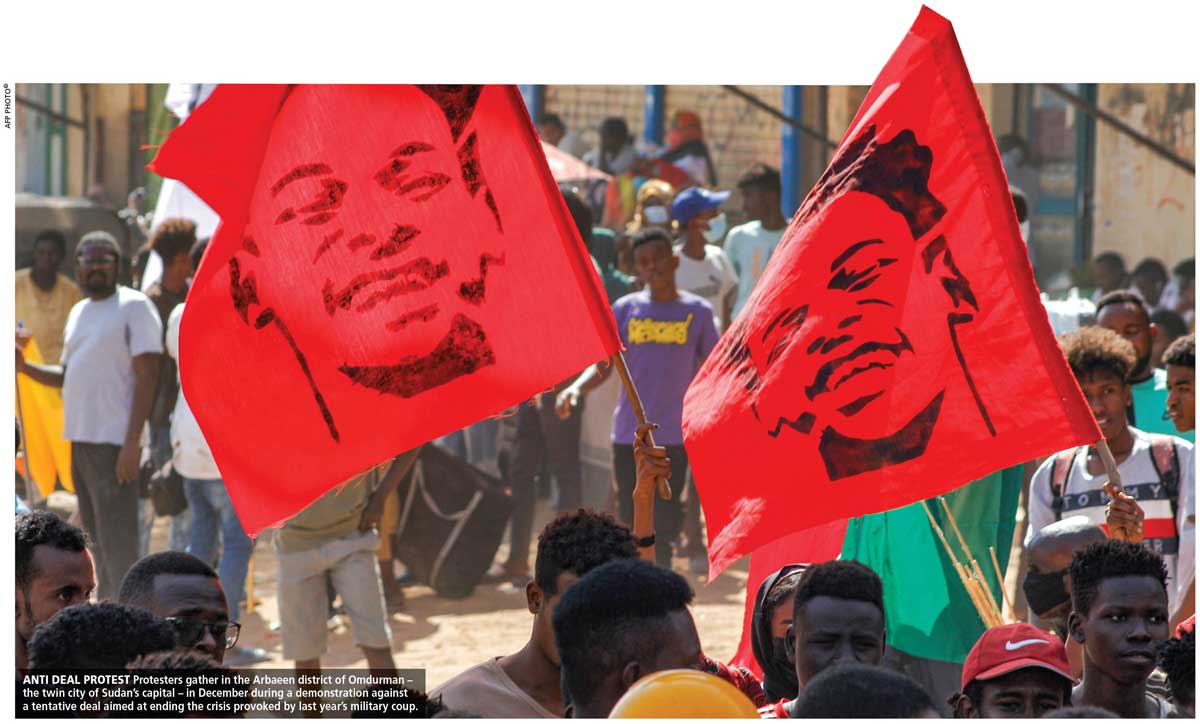SUDAN REPORTAGE
KILLER CRISIS UNFOLDING IN KHARTOUM
Saro Thiruppathy discusses the events that led to the situation in Sudan and efforts to bring about a ceasefire for humanitarian purposes
After weeks of tension between the Sudanese army and Rapid Support Forces (RSF) – which is a powerful paramilitary group – fighting finally broke out on 15 April.
Once upon a time, these groups headed by Army General Abdel Fattah al-Burhan and RSF leader General Mohamed Hamdan Dagalo a.k.a Hemedti were allies. And in 2021, they mounted a successful coup that overthrew the then president Omar al-Bashir.
In spite of international hopes that the 2021 uprising would have given Sudan’s population of 46 million people a chance to shed autocracy and opt for democracy, it turned out to be a Western pipe dream.
Subsequently, problems arose between the friends with regard to the manner in which the RSF was to be integrated into the Sudanese military and who would be the commander-in-chief of the military during this period of integration.
Since both parties seem to have been equally involved in overthrowing al-Bashir, they obviously wanted an equal share of the pie.
Sounds simple?
Apparently not…
HUMANITARIAN CRISIS So in classic armed group fashion, the dispute was taken to the streets of Sudan’s capital Khartoum and other cities, with media reports claiming that hundreds of people have been killed and thousands injured at the time of going to press.
Since intense fighting continues in populated urban areas, people are in dire need of water, food, money and medicines. The humanitarian situation is deteriorating at a rate as civilians are stuck in a war zone without many options for evacuation.
The UN estimates that an additional five million people will require emergency assistance and half of them will be children. It is also expected that more than 850,000 people will flee to neighbouring countries including Chad. This will place a huge strain on states that are already facing their own humanitarian crises.
It also appears that funding for Africa by governments of key nations is waning since funds are being directed to Ukraine. Some countries such as the UK are facing their own economic crises at home and budget cuts are expected in the US.
Meanwhile, Sudan’s neighbours are worried that the fighting in Khartoum and other cities could destabilise an already volatile region that’s bordering the Sahel, Horn of Africa and Red Sea.
RSF IN A NUTSHELL After nearly three decades of rule by al-Bashir, al-Burhan (who had risen through the ranks) took over as the ruler of Sudan in the aftermath of the coup and Hemedti took up his position as second-in-command.
Over the years however, Hemedti began aligning himself with civilian parties in a coalition that shared power with the military in the immediate aftermath of al-Bashir’s exit. It seemed as if he was trying to transform his image and cement his position in power.
The RSF, which evolved from the Janjaweed militias, was established in 2013. During the Darfur conflict in the 2000s, the Sudanese government used the paramilitary group to assist the army in quelling the rebellion. And in 2017, the RSF was declared an independent security force by law.
While the army possesses some 300,000 soldiers, air power and superior resources, the RSF too has been developing itself into a fighting force with equipment and around 100,000 fighters who have been deployed around the country.
FOREIGN ACTORS As with most conflicts around the world, there are interested parties lurking in the background and trying to influence different players in the Sudanese power struggle.
Western nations including the US are watching the situation closely. Saudi Arabia and the UAE have been trying to bolster stability in the region in the aftermath of al-Bashir’s ousting. Other Middle Eastern nations have been pursuing investments in various areas. And Russia wants to build a naval base on the Red Sea.
JEDDAH PEACE TALKS On 11 May, the media reported that the US-Saudi mediated peace talks in Jeddah to reach a humanitarian solution through a ceasefire were progressing well in spite of repeated failures in the preceding days.
However, The Africa Report begs to differ: “The war in Sudan will not be fixed by quick fixes, and the superficial and hurried support from certain Sudanese civil and political forces, as well as regional and international organisations eager to associate with US affiliated efforts, is not helping either.”
The article continues: “It bolsters the Humpty Dumpty diplomatic approach that has dominated US policy towards Sudan since the October 2021 coup d’état… The current situation is graver and more perilous than allowing another failure of efforts to restore peace, stability and a civilian democratic transition to the country. Only genuine civilian democratic transition can ensure that the first two take place.”
Could it be that the US and Saudi Arabia haven’t co-opted the efforts of other African nations in the peace talks because they prefer to focus on the process rather than the results?
Sudan’s neighbours are worried that the fighting… could destabilise an already volatile region that’s bordering the Sahel, Horn of Africa and Red Sea




